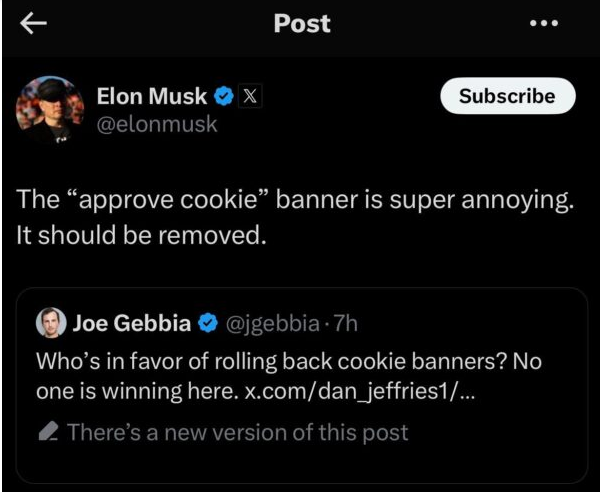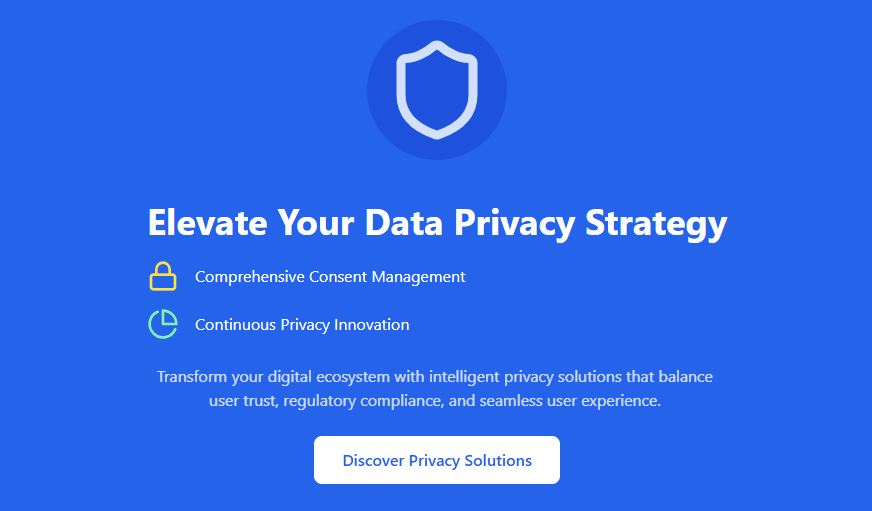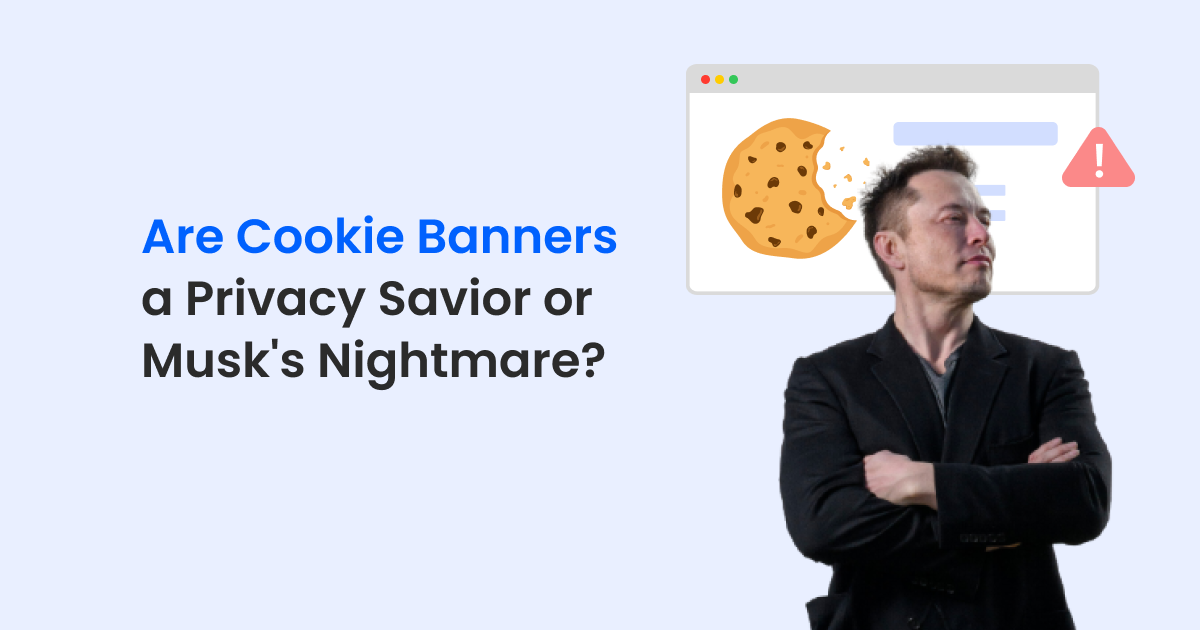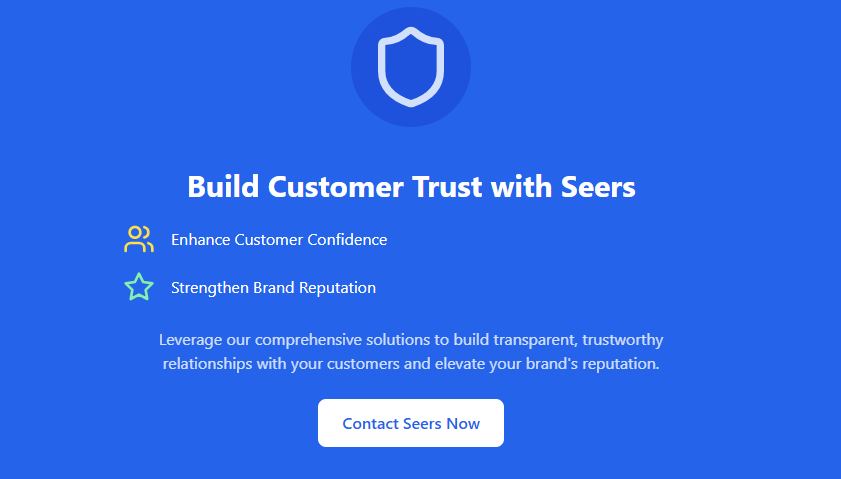Can you live in a world of silent surveillance? Every click, browse, and search you make is tracked without your consent. No warnings, no choice. Sounds scary?
That’s the world Elon Musk is promoting by criticising cookie consent banners as “annoying.” This matter heated up when Airbnb founder Joe Gebbia endorsed the new co-chair of the US Government Department of Efficiency, Elon Musk,

The statement by Elon Musk on cookie banners opened the way for many questions, discussions and concerns about user privacy. However, the crucial missing point is whether Ellon Musk encourages innovation or puts users at risk in an open digital Wild West.
In tests of cookie banners, the world is yet to see what their future holds; Seers finds the balance between full compliance and a smooth user experience. Seers provides customisable cookie consent solutions, which essentially empower users and meet legal requirements in bridging businesses across the sophistication of data privacy.
This blog will determine which opinion is more robust and logical. Whether you’re a user, a business owner, or a freelancer, this guide will help you understand whether cookie banners matter.
Understanding of Cookie Consent Banner
The small pop-ups on the website asking for permission to collect and use your data are called cookie consent banners. Cookies are tiny files that remain on your device and monitor your online activities, like what you click or what you search.
With banners, you’re in charge. You decide what to tell a website to collect about you. Without the banner, a company would likely get all the information you provided, whether that is location, habits, or even payment history.
Cookie banners are meant to protect your privacy. They ensure websites abide by the laws like GDPR, CCPA/CPRA, LGPD, etc. You might feel irritated sometimes, but these banners keep your digital rights.
Why do Cookie Consent Banners matter?
There are risks associated with open access to personal data that can be compromised or misused, exposing the user to financial losses or even privacy breaches.
Fines can be imposed on companies for careless user information management, and failure to comply with data protection regulations has legal consequences.
Without cookie consent, there is no other way to prevent data misuse, which is now very common in identity theft and targeted manipulation.
Whether you are a company or a user, you know how and where your stored data can be used. This helps avoid big scams and provides transparency by ensuring accountability.
Why People Are Favouring Ellon Musk Statement: What Makes Cookie Consent Annoying?
Users perceive cookie banners as obstacles, not tools. They are tedious, time-consuming, and, in most cases, misleading from the user’s perspective. The user’s wrong perception causes uncertainty and anxiety.
Interruptive Design
The cookie banner pops up as soon as one enters a site. This gets on one’s nerves, but at times, it is made so that one can sit up for long without dismissing the annoying interruption.
Too Many Clicks
Some cookies need multiple clicks to accept the preference or decline the cookie, which is highly irritating because operating such a banner will consume a lot of time.
Lack of Clarity
Many banners use vague jargon, making understanding what a user consents or agrees to complex. Less transparency can be deceptive as well.
Recurrent Popup
These banners keep returning; they even go on one’s favourite websites. It stresses the user and makes it invasive.
Forced Acceptance
The opt-out process on many websites is thus so complicated that they insist on accepting all cookies. This is not a natural choice and leaves many privacy-focused users highly annoyed.
Mobile Browsing Problems
It consumes a large part of the screen size on small screens, thus making navigation difficult.
Privacy on the Edge: The True Cost of a Cookie-Free World
In a world where data has become the new currency, removing cookie banners opens the way to serious privacy breaches. If no proper consent is obtained, a user may suffer from identity theft, surveillance, and exploitation.
User Privacy at Stake
Turning off cookie banners violates people’s privacy rights and puts them in danger. Below are some of the most critical privacy risks:
Identity Theft
Without proper consent, users’ personal information can be exposed and made available for use in theft. The Equifax breach (2017) is not an old case that should be forgotten. The personal information of 147 million Americans was leaked and widely stolen.
Surveillance
Unjustified data capture exposes an individual’s movement to be tracked without knowledge by a collecting company or even a state. The Facebook-Cambridge Analytica scandal in 2018 highlighted how personal data would be gathered and deprived of others without consent to manipulate voters.
Case Study
Marriott International
In 2018, Marriott announced that a security breach affected 500 million guests. Thanks to weak consent protocols and bold security measures, it compromised sensitive and personal data, such as passport numbers, email addresses and phone numbers.
Google’s GDPR Violation
French data protection authorities fined Google €50 million in 2019. The company does not meet the privacy standards derived from the GDPR.
The company was not taking consent for the data collection process, thus violating the right to privacy.
Data Misuse Scenarios
The consequences of misusing data are devastating. Privacy is compromised, and identity theft is ensured. The penalties range from fines, lawsuits, and reputational damage that different people face.
One of the scariest results of misusing data is financial losses. The First American Financial Data Leak showcases this example of how bad things can get.
In 2019, security breaches exposed more than 885 million sensitive information, such as bank account numbers and loan details, to residents with financial documents.
The leak indicates that organisations with direct access to sensitive financial data must protect their information and obtain permission from any customers using it to avoid economic damage.
Targeted Propaganda
Though people think of data collection as mere information gathering for fraud, the actual purpose is data collection into the weaponry of mass propaganda directed toward specific targets.
The Dow Jones data breach is a well-known example of this situation. Not only was the customers’ personal information exposed, but it was also used for targeted insights.
Personal data gathered from clients was used to create customised propaganda for foreign agents targeting a particular audience with the promise of influencing political views. It affected trust in online platforms and inappropriately manipulated public opinion.
Unauthorised Data Access and Tracking
Uber’s “God’s View” feature, which allows employees to monitor passenger traffic without their knowledge, can be an example here.
Uber faced a lawsuit in 2014 because it appeared the feature was being used to track passengers’ whereabouts.
Therefore, unauthorised access to data poses a serious threat to privacy. It not only means no privacy but also allows for greater surveillance.
After the release, many people said they used Uber and felt it was scary that their location and movements were tracked. Some even shrugged and said it could lead to a mishap that could result in their death.
Tension Between Freedom and Privacy: Musk’s Privacy Paradox
This still questions the privacy practice of X – formerly known as Twitter – and Elon Musk’s various companies. X was found collecting and misusing people’s personal information for advertisements.
Under the much-needed criticism of 2023, it has also remained victorious at being fined 150 million dollars by the Federal Trade Commission for violating user privacy based on data collected regardless.
Ethical Concerns: The Data Harvesting Dilemma
Ethical questions are raised because of the privacy stance taken by people like Musk. Data protection practices employed by Musk could be put to an offensive advantage by businesses, along with their prowess in amassing and deploying personal information without any restriction. The value of their data multiplies; however, their privacy diminishes.
The Free Speech vs. Privacy Paradox
Musk is a free speech advocate that he avows in open shows, accessible communication freed from all undue limitations. But it might turn against him at times when cookie banners need to be taken off, and privacy-related norms need to be relaxed.
It would be a means through which companies could deny customers data protection access through, say, the collection of less data.
In this case, personal loss is felt by individuals because they do not have control over data usage and may, without their consent, view their information being used for profit.
Therefore, Freedom of privacy becomes a contentious issue between these two freedoms that Musk fights for because it makes free speech and user privacy the opposite.
It may turn out that Musk’s new approach can drive a digital landscape upward. However, interestingly enough, questions are still raised regarding the tension between privacy and profit.
The Future of Privacy in Musk’s World
Musk’s stance could transform the digital landscape as we look to the future, but we must consider the long-term impact on privacy and consumer rights.
Just like built with cutting-edge technologies, Seers takes a giant leap in providing innovative solutions in the public domain by bridging the gap between privacy and convenience.
Today, features such as AI consent management and personalised banners are operating to define a future where privacy and experience interact in a superior way.
Normalising Less Privacy-Centric Ecosystems
Musk’s criticism points to an emerging world where privacy becomes a non-issue. Citizens, in this scenario, will be mere commodities: defenders of market freedom may well lose their control over data handling.
Power Concentration in Corporate Hands
The relaxation in privacy norms will likely benefit more giant corporations, help them gather more information, and further consolidate their control over user behaviour, thus putting consumer rights at stake and keeping power in a few great hands.
Is Convenience Worth Compromising Privacy?
Is skipping the consent from cookies worth our privacy? Will we barter away our consideration, and will the profit of corporations overshadow user rights in the future?
Musk’s approach could reshape the digital world, but it may come at a heavy cost to consumers.
Although a little irritating, cookie banners are essential in protecting user privacy.
It gives transparency and empowers users to control their data as it requires businesses to comply with specific privacy regulations. The other way would be to render users open to data misuse and untracked tracking.
Not for abolishing but for reforming. They can streamline consent processes, sharpen the point of clarity, and apply advanced technology to make these systems less intrusive while maintaining privacy. Adaptive banners and artificial intelligence-based consent tools are also pragmatic compromises.
Privacy is, after all, a fundamental right to be preserved while users seek convenience.
Consumer Advocacy: Improving, Not Removing
One approach that is quite visible today after a tweet by Elon Musk on cookie banners
tweet is the removal of cookie consent banners. This is not a solution to the “being annoying” situation. Today, we need to improve them.
Advanced solutions like Seers have gone one step further than doing away with annoying cookie banners. Seers has created an advanced consent management platform. This platform enables users to be open and transparent about their data while complying with GDPRs. Privacy is made easy and user-friendly all at the same time.
Cookie consent mechanisms would be refined further to reach the right combination of user privacy and frictionless experiences.
Enhancing Transparency and User Control
Modern solutions like Seers create banners allowing users to control how much of their data they want to share, improving transparency significantly. Besides, the European Data Protection Board states that transparency is essential.
Giving Users Customisation Tools
The cookie consent tools, such as Seers, change the scenario beyond just displaying a pop-up. Seers have created adaptive versions with better clarity improvements and better user controls. Examples include intelligent defaults, customising preferences, and ongoing compliance with improved user experience.
The Balanced Solution: Middle Ambivalence
This means cookie consent tools can learn a user’s behaviour to stop fading and breaking the banner, thus improving the overall user experience. For instance, Seers smart defaults can store users’ preferences and reduce repeated surveys.
Customised cookie banners will help businesses and users in terms of compliance. These adaptive, comprehensive, user-preference cookie banners are available to all.
The technology is a way of guarding privacy while making the experience more profoundly user-friendly.
Such innovations will enable organisations to manage their records and better empower users to have an incredible experience, access to enhanced security and control, and embrace transparency across all data.



